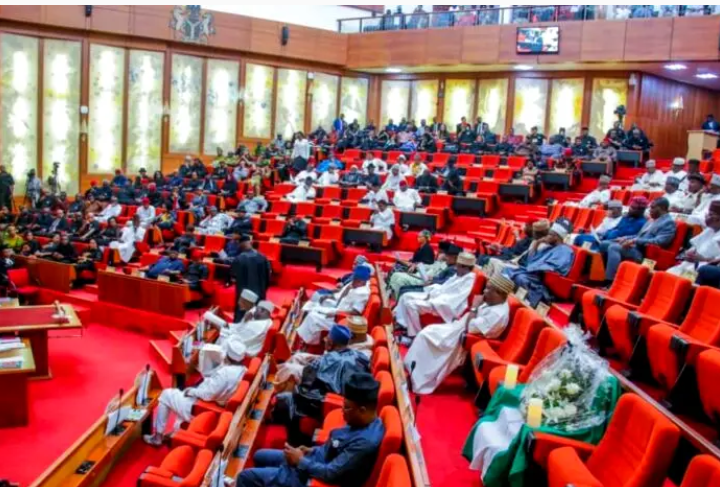The Senate has summoned the Group Managing Director of the Nigerian National Petroleum Corporation, NNPC, Mele Kyari to appear before it tomorrow to brief the lawmakers on the the controversial Petroleum Industry Bill, PIB.
Disclosing this on Wednesday during plenary, President of the Senate, Senator Ahmad Lawan said that the NNPC boss has been invited to address the Senators on the technical and financial details of the Bill before the consideration of the report tomorrow.
According to Lawan, the briefing will allow for Senators who are not members of the Joint Committee on Petroleum Resources, Down stream, Petroleum, Upstream and Gas Resources to get abreast with more information.
The Senate will tomorrow consider the report of the Joint Committee on the controversial Petroleum Industry Bill, PIB.
This was disclosed after the Report of the Joint Committee on Petroleum ( Downstream) Petroleum ( Upstream) and Gas Resources Petroleum Industry Bill, 2021 ( SB. 510) was laid by the Chairman, Senator Sabo Mohammed, All Progressives Congress, APC, Jigawa – West.
Recall that Lawan had mandated that all the Senators must get the copies of the report and that it will be considered tomorrow.
He, therefore asked the Joint Committee to provide lawmakers with copies of the bill ahead of its consideration to enable them study its content.
Lawan had said: “Let me use the opportunity to thank our Joint Committee for working so hard, selflessly and patriotically to produce the report on the Petroleum Industry Bill.
“This report, a copy each, must be made available to each and every Senator today, this afternoon.
“I don’t know how the Committee would arrange it, but every Senator must have a copy today.
“[And] we would be considering the report on Thursday.
“So, we have today, tomorrow until the beginning of Thursday to look at the report, so that when we consider it, we will be doing so on the basis of what we have been able to read from this very important report.”
Recall that Lawan had last month assured that the controversial Petroleum Industry Bill, PIB 2020 will be passed before the end of this month.
Lawan had assured that as Nigeria begins a new year, 2021, the controversial Petroleum Industry Bill 2020(SB)510 will be passed by end of the first quarter of the year.
The President of the Senate who spoke shortly after a closed-door session with the Security Chiefs had said that before that date, “we expect that our committees will still be working particularly the Joint Committee working on the Petroleum Industry Bill (PIB).
“We expect that the joint committee will be presenting its report to the Senate as soon as we resume. It is still our desire and determination to pass the PIB before the end of May.”
Also recall that the PIB scaled second reading October 2020 and after debate on the its general principles, the bill was referred to the Committees on Petroleum Upstream, Downstream, and Gas for reports in eight weeks.
Pending since 2007, the PIB which is an executive bill seeks, among others, to promote the competitive and liberalised downstream sector of the petroleum industry as well as the development of fuel and chemical industries.
Also recall that the President of the Senate who had said that the ninth National Assembly would make the passage of PIB part of its legacies, also assured that the National Assembly would pass the bill in good time without compromising proper scrutiny.
The new PIB is said to be important, especially as it aims at the restructuring as well as transparency and accountability in the oil and gas industry.
Specifically, Section 54(1, 2 and3 ) states among others that, “the Minister (of Petroleum) and the Minister of Finance shall determine the assets, interests, and liabilities of NNPC to be transferred to NNPC Limited or its subsidiaries and upon the identification, the minister shall cause such assets, interests, and liabilities to be transferred to NNPC Limited.
“Assets, interests, and liabilities of NNPC not transferred to NNPC Limited or its subsidiary under subsection 1 of this section shall remain the assets, interests, and liabilities of NNPC until they become extinguished or transferred to the government.”
Vanguard







